Previously we saw how the BBC programme ‘Hardtalk’ presented the guest interviewed in its July 16th (television) and July 17th (radio) editions as “the Palestinian ambassador in London”. As the synopsis to both versions indicates, the backdrop to that interview with Husam Zomlot is the BBC’s apparently continuing need to ‘explain’ why an event that it had spent a month and a half telling audiences – and itself – was going to happen on July 1st did not take place.
“It’s not clear when, or even if, Israel’s Prime Minister Benjamin Netanyahu is going to deliver on his promise to annex a large chunk of the occupied West Bank. It’s even less clear what the Palestinian strategy will be if it happens. HARDtalk’s Stephen Sackur speaks to the Palestinian ambassador in London, Husam Zomlot. With the conflict at a turning point, does the Palestinian leadership have the vision, imagination and credibility to mount an effective response?”
The myth that Israel had intended to apply civilian law to specific parts of Area C on July 1st was once again promoted by Stephen Sackur in his introduction and his opening question. [emphasis in italics in the original, emphasis in bold added]
Sackur: “My guest today is a trusted envoy of the veteran president of the Palestinian Authority, Mahmoud Abbas. Husam Zomlot represented the Palestinians in Washington during the early days of the Trump administration but his office was then closed down. Currently he’s the Palestinian ambassador in London. And right now he’s braced for the fall-out from what promises to be a turning point in the Israel-Palestinian conflict, if and when the Israeli prime minister delivers on his promise to annex roughly 30% of the occupied West Bank. Palestinians say annexation would represent a grave violation of international law and kill any hope of peace. They’re calling on the international community to pressure Mr Netanyahu to reverse course. But what of the Palestinians themselves? Do their leaders have the vision, the imagination, the credibility to change the dynamic of the conflict in a more positive direction?”
Sackur: “You Palestinians were preparing on July 1st to hear the announcement from the Israeli government that they were going ahead with the annexation of a major chunk of the West Bank. It hasn’t happened. Do you have any reason to believe it won’t?”
As we have had cause to note here on far too many occasions, it is of course amply clear that the very most that could have happened on July 1st was that – in accordance with the coalition agreement – the topic of application of Israeli civilian law to parts of Area C could have been brought to the cabinet for discussion as the first part of a process which includes further discussion in the Foreign Affairs and Defence Committee and in the Knesset.
Sackur’s distortion of facts extended to an additional topic: the closure of the PLO mission in Washington in September 2018.
Sackur: “You were the Palestinian representative envoy in Washington until the Trump administration decided it didn’t really want you around any more so here you sit as the Palestinian envoy in London.”
Audiences were not informed that the closure of that mission came about because of the Palestinian refusal to engage in negotiations with Israel and that it was rooted in US laws long pre-dating the Trump administration. Neither did they hear any challenge from Sackur to Zomlot’s distorted portrayal of that episode.
Zomlot: “…this is exactly why our office was shuttered, that it was sent off; not because they didn’t like me, but because we, the Palestinian people and the leadership, stood up, said, no, these are the contours, these are the rules, we will stick with it and what you’re doing is simply illegal. You cannot give a cover for Israel’s illegal annexation.”
Sackur likewise refrained from relieving BBC audiences of the false impressions given by a series of predictably inaccurate claims from Zomlot. With regard to the possibility of applying Israeli civilian law to parts of Area C, Zomlot claimed:
Zomlot: “For Netanyahu it’s simply a way of reassuring his re-elections, his control of the system, dodging criminal charges and he’s been achieving that. Also it serves as a key strategic function which is destroying the two-state solution.”
The second session of Netanyahu’s trial took place just three days after this programme was aired. Sackur failed to clarify to audiences at that point or any other throughout the programme that the US administration’s ‘Peace to Prosperity’ proposal, of which the application of Israeli civilian law is part, includes the formation of a Palestinian state with an increase of 30% of the territory it currently controls in Judea & Samaria.
Sackur failed to correct Zomlot’s apparent difficulties with numbers in the English language which resulted in a grossly exaggerated representation of the number of Jews living in Israel (6.7 million) and misrepresentation of the amount of land under Jewish ownership (apparently he meant to say 7%) in mandate Palestine.
Zomlot: “But let Israel be reminded that 66.7 million Israeli Jews are defining it as Jewish land, OK? Out of biblical claims.”
Zomlot: “From the Balfour Declaration of the UK in 1917, promising a Jewish homeland in Palestine – and at the time Jews own 2% – to the Partition Plan of 1947 offering Israel forty…55% when in fact they own 70% and it took us so long to accept the two-state solution.”
Audiences heard no reaction whatsoever from Sackur on the three occasions that his interviewee referred to ‘1967 borders’ that have never existed.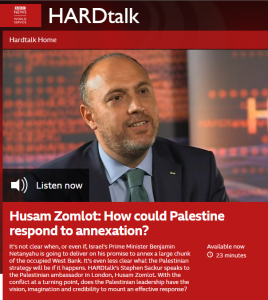
Zomlot: “The argument was, should you arm yourself with international legitimacy and law, you will get a state on the 1967 borders with East Jerusalem as its capital, and all of your historic issues, legitimate issues – like the issue of refugees – will be resolved.”
Zomlot: “And yes, we agree with Mr Johnson that the ‘67 borders is the mark, that nothing should be recognized beyond it, that international rules are very clear.”
Zomlot: “I believe that a two-state solution on the 1967 borders would have provided a beginning for addressing the real issues: equity, justice and a different interaction between the two sides.”
Sackur made no effort to challenge Zomlot’s use of the inaccurate term ‘colonial’ in relation to Israel or his absurd claim concerning an alleged intention to ‘replace’ a population which currently grows by 2.65% annually.
Zomlot: “They see the unabated colonial exercise that is intending not only to take over the land but to replace the Palestinian people. […] The reality is we are still under colonial expansion that is not seeing us as part of the land.”
Thanks to Sackur’s failure to intervene, audiences were left with the mistaken impression that the Oslo Accords committed both sides to a two-state solution with the establishment of a Palestinian state.
Zomlot: “But all this was meant…the Palestinian Authority was meant to take us from occupation to independence. That was the key function why we, with the international community, established the Palestinian Authority.”
Zomlot: “The issue is about the Palestinian Authority as an institution that was meant to last for five years from 1994 to 1999 as per the agreements we signed with Israel, as per the commitment of Israel. That five-year period was meant to build the capacity of the Palestinian Authority to become a full-fledged state. In these 27 years since we last signed the Oslo Agreements Israel has made mockery of these agreements.”
The claim that Palestinians ‘own’ the entire area was also not challenged by Sackur.
Zomlot: “The tens of thousands of [Palestinian] people know that their issue is not economic. They know that they are not poor because of a natural disaster. They know that they live and own one of the most rich lands on earth. Before the foundation of Israel we were one of the richest in the region and we remain to be one of the richest in the region. This is not an economic issue.”
Zomlot: “It took us so many years – the 60s, the 70s, the 80s – to come to terms with the counter proposal that was brought to us by the world that we must accept a state on 22% of our land.”
Neither did he request any evidence to support Zomlot’s claims concerning a supposed government ‘plan’ (actually a ‘wish list’ from a person not currently in the government).
Zomlot: “We started the peace accords with less than 125,000 settlers. Today we’re talking about 750,000 settlers and the extremist government in Israel are talking about a plan of one million in less than two years.”
Zomlot’s deliberate misrepresentation of the coalition agreement under which the current Israeli government was formed was not challenged by Sackur.
Zomlot: “In the past Israel has nullified all agreements. The moment it had announced in its own government formation, from the far-Right to the Left, from the settler movement through the Likud to Labour, that they will illegally annex occupied territories, they nullified all the agreements we signed. It’s over. So we cannot continue committing to these agreements.”
As was the case in his previous interview relating to the potential application of Israeli civilian law to specific parts of Area C, Sackur avoided explaining to his audience that the area concerned was part of the Mandate which charged the Mandatory with creating conditions “as will secure the establishment of the Jewish national home” or that Jordan illegally invaded and occupied that territory in 1948.
Remarkably, this entire interview – supposedly on the topic of the Palestinian leadership’s “vision, imagination and credibility” – ignored the prime issue of the divide between the various Palestinian factions. Palestinian terrorism, the refusal of factions such as Hamas and the PIJ to accept a two-state solution to the conflict and the issue of the Gaza Strip as a precedent were erased from the picture presented to audiences.
Sackur refrained from any serious investigation into what Zomlot and his PLO colleagues actually mean when they refer to a two-state solution and failed to ask the key question of whether the Palestinians would recognise Israel as the Jewish state, even though Zomlot provided reasons to delve deeper into those crucial points.
Zomlot: “…the two-state solution was never a Palestinian demand. It was a Palestinian concession to ally ourselves with international law.”
Zomlot: “I believe that a two-state solution on the 1967 borders would have provided a beginning for addressing the real issues: equity, justice and a different interaction between the two sides. Yes, I consider ending Israel’s occupation, establishing a sovereign state, to be a milestone in our journey as two communities to actually build a different [unintelligible].”
When the BBC invites Husam Zomlot to participate (as it regularly does) it knows exactly what audiences are going to hear. Nevertheless, BBC journalists – including Stephen Sackur – repeatedly refrain from challenging his serial distortions and falsehoods and avoid asking the challenging but relevant questions – such as why the PA’s interpretation of the two-state solution does not include recognition of Israel as the Jewish state – which would enhance audience understanding of why the conflict persists.
(A transcript is available below)
Related Articles:
BBC’S ‘HARDTALK’ RECYCLES AN INACCURACY PREVIOUSLY ACKNOWLEDGED AND CORRECTED
‘HARDTALK’ RECYCLES THE BBC’S AREA C STORY TALKING POINTS
BBC NEWS REPORT ON US CLOSURE OF PLO MISSION FAILS TO ADEQUATELY INFORM
CONTEXT LACKING, INACCURACIES LET SLIDE IN BBC WS COVERAGE OF PLO MISSION CLOSURE
BBC NEWS SILENT ON ABBAS’ REJECTION OF JEWISH STATE
WHY IS THE BBC’S FAILURE TO PROPERLY REPORT THE JEWISH STATE ISSUE IMPORTANT?
EXAMINING THE BBC’S CLAIM OF PALESTINIAN SUPPORT FOR THE TWO-STATE SOLUTION
Transcript [emphasis in italics in the original, emphasis in bold added]:
Sackur: “My guest today is a trusted envoy of the veteran president of the Palestinian Authority, Mahmoud Abbas. Husam Zomlot represented the Palestinians in Washington during the early days of the Trump administration but his office was then closed down. Currently he’s the Palestinian ambassador in London. And right now he’s braced for the fall-out from what promises to be a turning point in the Israel-Palestinian conflict, if and when the Israeli prime minister delivers on his promise to annex roughly 30% of the occupied West Bank. Palestinians say annexation would represent a grave violation of international law and kill any hope of peace. They’re calling on the international community to pressure Mr Netanyahu to reverse course. But what of the Palestinians themselves? Do their leaders have the vision, the imagination, the credibility to change the dynamic of the conflict in a more positive direction?” […]
Sackur: “You Palestinians were preparing on July 1st to hear the announcement from the Israeli government that they were going ahead with the annexation of a major chunk of the West Bank. It hasn’t happened. Do you have any reason to believe it won’t?”
Zomlot: “No I don’t have any reason so far to believe it won’t happen. The calculus with Netanyahu, the calculus in Israel is still the same. The net game for this government is clear. For Netanyahu it’s simply a way of reassuring his re-elections, his control of the system, dodging criminal charges and he’s been achieving that. Also it serves as a key strategic function which is destroying the two-state solution. And he’s been public about it since he was elected first time in 1996. He’s hostile to the very idea of a sovereign independent Palestinian state and it serves a political function, a distraction. Everybody’s up in arms about him stopping annexation when in fact the discussion should be on ending occupation so now he’s comfortable and therefore the world did not produce such sufficient consequences for Netanyahu to stop annexation.”
Sackur: “Yeah, you’ve just given me an answer which dug deep into the politics, as you see it, of Mr Netanyahu and the Israeli government. What you didn’t give any sense of though – and I wonder if you appreciate it – is the degree to which, for Netanyahu and for his government, this isn’t just a matter of politics; it is a matter of who they believe the Jewish people are and what fundamental rights based on law, history and even the bible, rights that they have and have a right to pursue.”
Zomlot: “Can you imagine a world where such a premise would be the base of our international relations? Can you imagine a world where issues of land and territory and sovereignty has to do with myths and [unintelligible] and emotions and feelings? Why did we establish the United Nations? Because of the horrors of the second World War. Because what we did to each other. Because of the never again. We decided to establish…”
Sackur [interrupts]: The rhetoric I’ve heard before. I just want to know whether when, for example, Danny Danon the outgoing UN ambassador for Israel, when he says to me, as he did just the other day, we cannot annex what is already ours. When you hear people representing the government of Israel say things like that, do you…is there any room for dialogue?”
Zomlot: “No, no. And that’s what we have been saying. You see there are two ways to look at this situation. Either a political, legal way which we the Palestine Liberation Organisation, the PLO, the rest of the world have been seeing, defining Israel’s occupation of the 1967 areas is a military occupation. It is temporary. The international law applies. Israel must cease that occupation. That’s the political, legal. And hence we entered in various peace processes to find only mechanisms to back-roll that occupation. The second way to look at it is that biblical, religious. But let Israel be reminded that 66.7 million Israeli Jews are defining it as Jewish land, OK? Out of biblical claims, they forget that they live in between 1.2 billion Muslims who define the entire historic land of Palestine as an Islamic waqf. That Jerusalem was the first qibla, the direction of prayer for all these Muslims. They forget that billions of Christians also have claim on the land. And therefore you’re talking about the Armageddon. You’re not talking about peace processes. You’re talking about the [unintelligible] of God. So people like Danny Danon are dangerous.”
Sackur: “The fact is though, Ambassador, that Danny Danon and others close to Mr Netanyahu can espouse their belief of the legitimacy of what the international community calls annexation, because you Palestinians, time and time again over the last few decades, have rejected peace plans which would have given you so much more than you can possibly imagine getting today. It’s your rejectionism that has landed you in this place.”
Zomlot: “How on earth have we rejected anything? I mean, the only thing we…”
Sackur: “Do you want me to list all the different moments, the different peace plans when the Palestinians have rejected and walked away from essentially getting 95%, 97% of what they wanted in terms of occupied land?”
Zomlot: “You know, prison guards need only 2% of the prison area to control the lives of the prisoners. And this is exactly every single peace offer that came our way over the last 30 years. Today marks the 41st anniversary of the first visit of Yasser Arafat to Europe. It was to Vienna in 1979, in July. He met the Chancellor there, then Bruno Kreisky, and the engagement started the pressure by Europe and the international community to accept the PLO, accept the two-state solution. The argument was, should you arm yourself with international legitimacy and law, you will get a state on the 1967 borders with East Jerusalem as its capital, and all of your historic issues, legitimate issues – like the issue of refugees – will be resolved. That was the argument. So that was never, the two-state solution was never a Palestinian demand. It was a Palestinian concession to ally ourselves with international law. This moment is more about international system, international order than it is about us. I think we have compromised enough.”
Sackur: “You were the Palestinian representative envoy in Washington until the Trump administration decided it didn’t really want you around any more so here you sit as the Palestinian envoy in London. Therefore, you know better than me the realities of politics and diplomacy today. Donald Trump with his peace plan has in essence given a green light to Binyamin Netanyahu to complete this annexation policy. That is a reality that you cannot change.”
Zomlot: “Yeah but we can stand up for, and this is exactly why our office was shuttered that it was sent off, not because they didn’t like me, but because we, the Palestinian people and the leadership, stood up, said, no, these are the contours, these are the rules, we will stick with it and what you’re doing is simply illegal. You cannot give a cover for Israel’s illegal annexation. And you know, Stephen, sometimes in our situation, and you just said that I was the ambassador to the US – I know I was in the crossfire. I know the sheer pressure on us, the Palestinian people and leadership. To stand up is not a small measure.”
Sackur: “But the fact is, I’m looking at all of the different European and Arab reactions to the Netanyahu annexation plan. They’re all, of course, saying don’t do it and if you do do it, there will be serious consequences. Just to pluck one out of the air, Boris Johnson: ‘I profoundly hope that the annexation does not go ahead. If it does, the UK will not recognise any changes to the ’67 lines except those agreed between both parties.’ You like all of that. But the bottom line again is that Washington is the place that counts. And you’ve just heard Secretary of State Mike Pompeo say that the US administration no longer regards Jewish settlements in the West Bank as illegal. That, again, is the diplomatic reality.”
Zomlot: “And we don’t accept that as…”
Sackur [interrupts]: “Well, you may not accept it…hold on…but unless you have plans to somehow remove Donald Trump, Mike Pompeo and the entire team, that’s the diplomatic reality you live with.”
Zomlot: “If you tell me that Trump and Netanyahu decides the terms, defines international rules and international law, then we should find that other discussion. That’s not the United States behind Netanyahu. That’s Trump and few – four – of his team in the White House behind Netanyahu. We are also following the huge opposition in the US, in the Congress, in the Democratic party, in the Jewish community, in the civil society, in the media, in the elites, in the think tanks. No, that’s not the United States; that’s one person, that is Trump. And yes, sometimes you cannot be offensive in your ideas and strategies, you have to be defensive and sometimes you need to protect yourself, protect what you believe in and ally with the people that you think will one day create another chances. And yes, we agree with Mr Johnson that the ‘67 borders is the mark, that nothing should be recognised beyond it, that international rules are very clear. But we also would like to see more action and we have been saying this to the government here. Netanyahu will not listen out of just statements. He need to know that there will be severe consequences and the State of Palestine need to be recognised now because if you don’t recognise it now, level the field, give hope about the two-state solution, then if you do that later it not really serve any purpose.”
Sackur: “The Israeli cabinet is suggesting that the annexation plan hasn’t been shelved, it may come to fruition in late July – we don’t know yet – but if it comes to fruition, the Palestinian Authority, which you represent, seems to be suggesting that it will respond by cutting all funding, all support for its own activities across the piece from security through healthcare, schooling, everything. It seems to be saying we will close down the Palestinian Authority; we will not act as an agent of Israel in our own places. What is the point of this self-harm?”
Zomlot: “It’s a fundamental point. It’s a point about definitions. This is not about self-harm or whatever…”
Sackur [interrupts]: “It seems perverse. It is going to create the most almighty humanitarian crisis for your own people.”
Zomlot: “You are absolutely right that we should preserve and even, you know, build more of our national institutions, improve our services, our delivery, our consultation, our democratic process. But all this was meant…the Palestinian Authority was meant to take us from occupation to independence. That was the key function why we, with the international community, established the Palestinian Authority. Israel wants the Palestinian Authority to remain as a service provider under occupation to our people and therefore it serves Israel to maintain the status quo. And we know that we need national institutions. We need the Palestinian Authority. It does crucial function in the health arena; look at us today with the Coronavirus pandemic. In the education arena; only two days ago our high school certificates and it’s a pride we have one of the highest PhD graduates worldwide…”
Sackur [interrupts]: “Yeah but you’re talking about abandoning your own people.”
Zomlot: “Yes but…”
Sackur: “Hussein al Sheikh, the official in charge of relations with Israel, he says if they go through with the annexation then they can go back to being the occupying power throughout the whole West Bank. Betrayal of your own people.”
Zomlot: “Israel cannot have the cake and eat it too. Our people want one thing. They want [unintelligible], freedom. You know not with bread a human being can only live. We live with dignity.”
Sackur: “Well, Ambassador, it’s fairly easy for you to say that in a comfortable place here in London representing the Palestinian Authority. What about the tens of thousands of people who will have no salary if the Palestinian Authority refuses to pay?”
Zomlot: “The tens of thousands of people know that their issue is not economic. They know that they are not poor because of a natural disaster. They know that they live and own one of the most rich lands on earth. Before the foundation of Israel we were one of the richest in the region and we remain to be one of the richest in the region. This is not an economic issue.”
Sackur: “Well it’s an economic issue for lots and lots of people. What about the Gaza Strip for example? The Palestinian Authority may not care so much about the Gaza Strip because of course it’s controlled by Hamas, not by Fatah.”
Zomlot: “I am a Gazan. I was born in Gaza to a refugee family and we know exactly what has been happening in Gaza. It’s primarily an Israeli blockade.”
Sackur: “Hang on a minute. When your colleague…when your colleague Hussein al Sheikh says that they are gonna slash the $150 million that the Palestinian Authority sends to Gaza each month to cover things like utility fees, medical fees, everything else, when he says he’s going to slash that money because, on principle, he won’t operate as an agent of Israel, how do you think the people of Gaza with the 53% poverty rate, the 50% unemployment, are gonna feel about that?”
Zomlot: “No, no, I’m sorry, you are misleading in this. Nothing will be slashed and the responsibility of the leadership on the people in Gaza, in Jerusalem and in the West Bank, in the refugee camp outside, is solid and clear is our responsibility. You ask me that I represent the Palestinian Authority. I don’t. I represent here the Palestine Liberation Organisation. My office in London is called the PLO office. My office in Washington was the PLO. The Palestinian Authority has no diplomatic arms. The PLO remains to be the umbrella, the institution of the Palestinian people. The PLO shall continue being responsible and providing for our people in Gaza, in Jerusalem, in the West Bank and everywhere else outside, in the refugee camps. The issue is about the Palestinian Authority as an institution that was meant to last for five years from 1994 to 1999 as per the agreements we signed with Israel, as per the commitment of Israel. That five-year period was meant to build the capacity of the Palestinian Authority to become a full-fledged state. In these 27 years since we last signed the Oslo Agreements Israel has made mockery of these agreements.”
Sackur: “The other thing that has been said by officials in the PA is that they will end all security cooperation with the Israelis. Now…”
Zomlot [interrupts]: “We have already ended.”
Sackur: “You’ve already ended it. So we are now talking about chaos. We’re talking about insecurity which could spiral out of control. Is it that you want a new Intifada?”
Zomlot: “No this is not what we want. What we want is enough status quo. We are tired. We are sick and tired, Stephen, of telling everybody that Israel is disingenuous. It’s not serious. With every brick it has built since 1993 after signing the peace agreements and look at it now. We started the peace accords with less than 125,000 settlers. Today we’re talking about 750,000 settlers and the extremist government in Israel are talking about a plan of one million in less than two years.”
Sackur: “But what do you think…hang on…what do you think will happen when you withdraw all…all security cooperation with Israel? You said you’ve already done it. The UN envoy in the Middle East says that he fears that there will be a trigger, conflict and instability will spread across the occupied West Bank and in Gaza too. I put it to you again: is that what you want?”
Zomlot: “No. What we want is what the representative of the UN wants. We want accountability. We want the implementation of international resolutions. We want justice for the young man in Jerusalem who was killed last month – el Halaq – autistic Palestinian and this morning, just this morning, his family was told by the Israeli authorities in Jerusalem that the cameras around were not functioning. They requested a copy of the cameras. You know why? Because they wanted to shield the killers. Stephen, we decided to stop coordination. We announced that we are absolved of all agreements for two reasons. In the past Israel has nullified all agreements. The moment it had announced in its own government formation, from the far-Right to the Left, from the settler movement through the Likud to Labour, that they will illegally annex occupied territories, they nullified all the agreements we signed. It’s over. So we cannot continue committing to these agreements.”
Sackur: “So here’s where I have a profound problem with your position. You say it’s all over. You say that there is nobody to talk to in Israel and yet at the very same time your only strategic offer appears to be to get Mr Netanyahu to reverse course on the annexation and then, you say – according to your senior officials who’ve just put this in writing – you want to go back to the negotiating table. You want the so-called Quartet, the international powers, to become involved and resume a negotiating process which you’ve just said to me in the course of this interview has got you precisely nowhere over the last 27 years. What kind of strategic vision is that?”
Zomlot: “Well for anybody who wants to see an implementation of the two-state solution, here you go: three things. First we need a framework and that framework has got to be the international framework. That’s why we came to the peace process. And by the way, this whole international resolutions was a pressure by Israel. Israel wanted a two-state solution in the 70s…”
Sackur: “With respect, you say you want to go back and have the international community involved but Donald Trump, you’ve said in highly personal comments, has blown up the entire peace process, he’s killed Oslo. You’ve accused him of the most heinous political crimes and now you say you want the Quartet – which of course involves the United States – to oversee new negotiations with Mr Netanyahu. It seems to me – and I dare say to many Palestinians – that your strategy doesn’t make sense.”
Zomlot: “We had a strategy. The strategy was two states based on international legitimacy and that the world will come, will guarantee it, will move to it. That strategy failed because of Israel.”
Sackur: “Let me quote you the key line from the Palestinian Authority message to the Quartet that was released just a few days ago. ‘We Palestinians’, it says, ‘are ready to resume direct bilateral negotiations where they stopped in 2014’. That means after everything you’ve said to me about Mr Netanyahu, about his motives, about what he’s done, about what Israel is doing to the Palestinian people, you are simply prepared to go back and resume negotiations. Your own people are gonna say what on earth is the point. Who are you kidding?”
Zomlot: “No, if…if the international framework is reference, if there is a multi-lateral mechanism for mediation and should this process has a timeline, I believe this is to our interest. We are orientated towards a solution. We are not rejectionists, Stephen. We are the ones who are losing our kids by the day with no accountability. We are the nation that is losing its land by the day. Yes of course we want a solution. But not any solution.”
Sackur: “You say we’re not just rejectionists; isn’t the truth that you’re led by a man, Mahmoud Abbas, who’s been in power since 2005. His term in office actually expired in 2009. He no longer has any democratic legitimacy. He isn’t accountable. He’s been accused of cronyism and corruption for years. There is at the heart of the Palestinian leadership – and I’m quoting Hani al Masri here, the head of the Masarat think tank in Ramallah – a sense that the leadership is working in a haphazard way without a clear strategy. That’s what it looks like.”
Zomlot: “Seriously you…we just blame the victim all the time…”
Sackur: “But this is a Palestinian saying this. I can quote you other Palestinians. Diana Buttu – a former member of the negotiating team – says that the Palestinians are acting like they have no legitimate counter proposals to put and end this Israeli occupation.”
Zomlot: “What counter proposals? We have made the biggest counter proposal in our history. It took us so many years – the 60s, the 70s, the 80s – to come to terms with the counter proposal that was brought to us by the world that we must accept a state on 22% of our land. And you know what? This annexation thing is an opportunity. Actually it serves some useful purpose: to revisit everything we have done. And it’s gonna take us time. From the Balfour Declaration of the UK in 1917, promising a Jewish homeland in Palestine – and at the time Jews own 2% – to the Partition Plan of 1947 offering Israel forty…55% when in fact they own 70% and it took us so long to accept the two-state solution. Don’t accept or expect us to come up with a strategy instantly.”
Sackur: “What Diana Buttu is getting to is that…”
Zomlot: “We need to consult our people in a democratic process and tell our people here you go. Here you are and let’s go together to a new destination.”
Sackur: “Do you still believe in this tired old phrase the two-state solution?”
Zomlot: “I don’t think Israel is interested in any solution, be it one state or two states.”
Sackur: “I asked whether you believe in a two-state solution.”
Zomlot: “I believe that a two-state solution on the 1967 borders would have provided a beginning for addressing the real issues: equity, justice and a different interaction between the two sides. Yes, I consider ending Israel’s occupation, establishing a sovereign state, to be a milestone in our journey as two communities to actually build a different [unintelligible].”
Sackur: “Polling across the Palestinian territories shows support for the two-state solution at its lowest since surveys began around the time of the Oslo Accords in 1993. Huge numbers of Gazans in particular have left and left for good it seems. 35,000 last year went through Egypt and didn’t return. 150 young doctors in Gaza appear to have left and made new lives overseas. It looks like young Palestinians in particular have lost faith in the notion that there ever can be this two-state solution.”
Zomlot: “Can you blame them? I mean they are there, they see everything on the ground. They see the encroachment of the settlements around their houses. They see the unabated colonial exercise that is intending not only to take over the land but to replace the Palestinian people. You can’t blame them. This whole thing – one state, two states – Stephen, is a distraction. It’s a distraction. The reality is we are still under military occupation. The reality is we are still under colonial expansion that is not seeing us as part of the land. We are still besieged in Gaza. You know during the Coronavirus we tried to distribute food in East Jerusalem and anybody who would voluntarily distribute food would be arrested by Israel. This is the reality. The reality is grave injustice. We need to think about do we stop these injustices. I now care less as a person about the form of the solution. I want these grave injustices that have lasted for a hundred years to stop.”

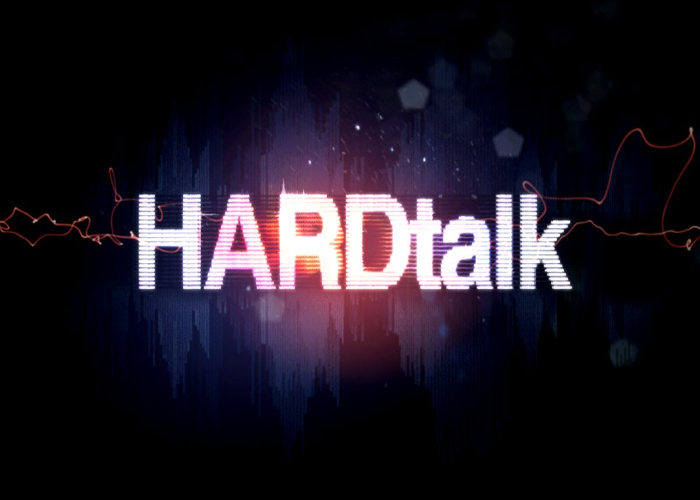
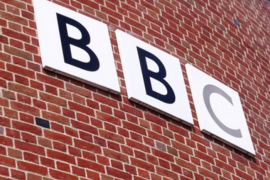
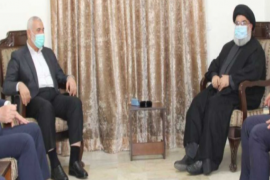
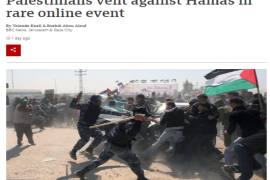
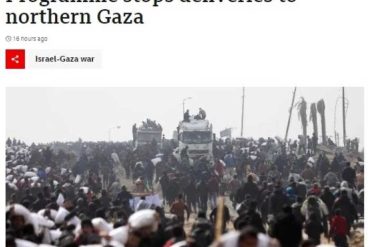
The BBC Hardtalk program has never produced a pro-Israel broadcast in it’s entire production history, but then they must abide by the instructions of their Iranian paymasters